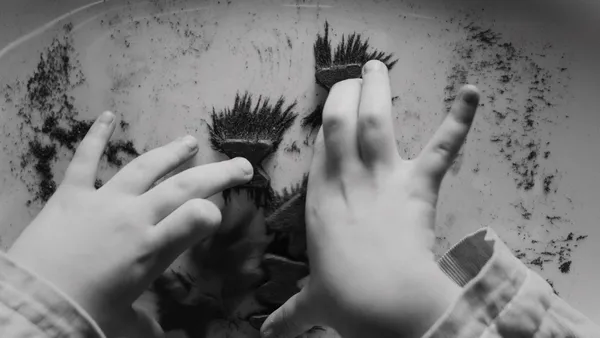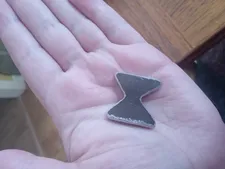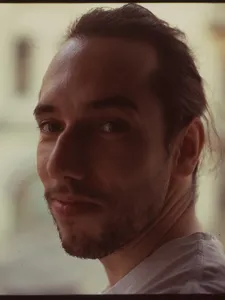 |
| Iron Butterflies.. Roman Liubyi: 'There's the quote from Pina Bausch that when you have no words, the gesture could help, so that’s the case' |
Iron Butterflies - a name that refers to the shape made by shrapnel from BUK surface-to-air missiles on metal - takes a sensorial approach to considering the downing of Malaysian Airlines flight MH17, which resulted in the death so 298 people.
Although there are traditional documentary elements that consider the timeline and the aftermath of the crash - after the plane was shot down by a Russian missile, which the country strenously denied - there are also experimental segments of performance art that evoke a more emotional response.
When I catch up with the director Roman Liubyi to talk about the film shortly before its premiere in the World Cinema Documentary competition at Sundance Film Festival, he says he “aiming to be weird”.
He adds: “It’s just, there is no other way to tell this story. We were thinking that it would only be made with material from criminal cases, so a pure documentary. But then the concept was changing and here we are.”
At this point Liubyi gives me a small butterfly-shaped piece of metal - like the ones which are so crucial during the investigation into the MH17 crash and that indicate it was a Russian BUK missile which caused it.
“I wanted to give you this,” he says. “We will give it to each person at the premiere. It’s made by my father, who is also the art director of the film. It's made from the parts of a rocket that fell near the house of my parents. So it's basically one kilometre from the bridge from the final scene of the film.”
There’s no doubting that holding the small piece of metal in my hand really does make me think about all those other small pieces of metal coming away from the fuselage of MH17 after the missile strike, somehow bringing it a little closer to home.
Liubyi - whose family are currently taking refuge with a British actress in London - adds: It’s our home, a mass murder of 298 people from different continents happened so we just feel that we need to speak out about it.”
The film works chronologically through the story of the plane crash and the subsequent investigation into it but it also illustrates the Russian propaganda machine, which at first treats the crash in celebratory fashion - a stance echoed by some caught on mobile phone footage - until it rapidly changes tack when it emerges it was not a Ukranian transport plane but a commercial airliner.
“Propaganda is really like radiation,” says Liubyi. “It goes deeply into the mind, almost to the DNA.”
 |
| Roman Liubyi is handing out iron butterflies at the premiere.: 'It's made from the parts of a rocket that fell near the house of my parents' |
The project was produced by Ukranian film collective Bablylon 13, who are currently working on a fresh project that was shot at New Year on the frontline. He says: “The guys from air reconnaissance were showing me the how how Russians behave on a battlefield. It’s really weird, it looks like a zombie apocalypse. The only answer as to why it's happening is really like deep, deep propaganda influence.
Among the propaganda laid out in the documentary is films from the Ministry of Defence of the former USSR, which show the BUK missile launcher and celebrate signing up, which Liubyi says have a “weird poetry about them”.
When considering the sudden change in the propaganda, from celebratory to cover-up, the director adds: “What I found is that there are no strategies, there are only tactics. They don't care about the previous versions of what happened. They just like floating. There's a flood of bullshit.
When considering Russia today, Liubyi says that even among those in the country who don’t agree with the invasion of Ukraine, still have a colonial attitude to the former Soviet state.
“They consider us as a younger brother, so a pretty colonial attitude.”
Talking about the genesis of the film, Liubyi says: “I started this project with two short documentaries about war crimes made only from materials from criminal cases. So, this pure documentary form.”
Those films drew on criminal case files but he realised that he woulnd’t have the same access with Iron Butterflies because the case was ongoing.
 |
| Roman Liubyi: 'Propaganda is really like radiation' |
"And about the emotions, I'm actually very careful with this word. Because I see how the Russian propaganda is using emotions - it's very emotional all the time. So I'm very careful with it. I was looking for words to describe it. I am trying to tell the story with my soul more than with my mind.
“If I could compare this concept with a book, then the documentary part is probably the excerpts from news and magazines, and then this dense physical theatre/part black and white is more like artistic illustrations between the chapters.”
The sound design in terms of the unsettling score and segments when, for example, the names of the victims are read out is also a key part of the film.
Liubyi explains that his core team of himself, his DoP and his sound designer work closely together, more so than on many productions. He adds: “It sounds backwards as this is such a dark topic but it’s made in pure love.
“I forced my sound designer to be involved in every single stage of the production. We were working in his studio for a really long time. And it's pure magic for me. We have this weird sort of reality in this film that we could make it sound any way that we feel. So we were looking for this unique sound of this universe, of the universe of iron butterflies.”
Speaking about the Russian invasion, Liubyi says: “Now everything has changed. It’s interesting that before full scale invasion, our film was kind of warning. Now [the invasion has ] started, there’s no point in a warning, everything already happened. For a pretty long time I lost the meaning of the film and it was hard work to find a new meaning. Now I think it’s more the analysis and memorial for this event.”
Back on the subject of propaganda he adds: “I think it's something really dangerous for the global media ecosystem. And we I think we do not really understand now what are the consequences of that Russian media activity around the MH17 because it's the most international war crime so they were they were producing a lot for for audience abroad.”
The film also highlights how tricky it is for the West to sanction Russian while still being reliant upon its gas.
“I just think that Western people don't don't understand that it's real mafia,” says Liubyi. “The Russian government? Even mafia is too pretty a word for them. They make fun of the European judiciary and they consider Europe as some kind of nerds.”
Looking forward to the future, Liubyi says: “This is my secod film dedicated to the Russian Ukrainian war but I really wish to share our culture through cinema. I want to tell stories about Ukraine, not through the prism of war. I hate it.
“I want to make a carton for Ukrainian kids. It’s based on Ukrainian folklore. I think it could be even more important than telling about the war because we're fighting to protect our land, our homes, our beloved and protect our culture, because this is what Russia hates - that we are different. Because they are thinking about us again, like a small brother. They have no respect for another culture.”
























